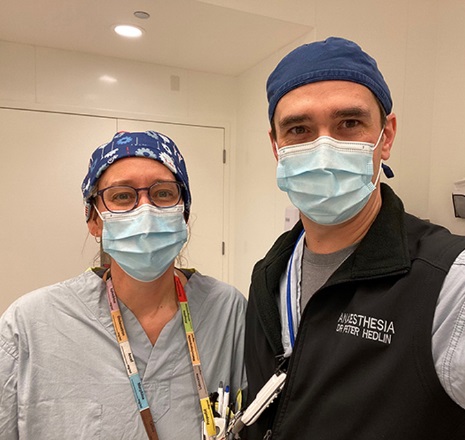By Kristen McEwen
Dr. Peter Hedlin (MD), an assistant professor and clinical scientist in the Department of Anesthesiology, is leading a research project entitled, "Virtual reality, a viable tool for rural anesthesia skills enhancement."

Drs. Justina Koshinsky (MD), left, and Peter Hedlin (MD) are investingating virtual reality as a possible tool to refresh rural physicians' skills. (Submitted photo)
Virtual reality allows rural physicians to practice anesthesiology scenarios in a simulated environment before encountering the situation in real life with a patient. Some situations are rare, such as local anesthetic toxicity, or malignant hyperthermia - when a patient has a severe reaction to anesthesia.
"The problem is these scenarios happen so rarely that it's hard to keep your skills up in those areas," Hedlin said. "For example, even in a five-year residency we may not see some of those clinical scenarios. So the question is, how do you keep someone's skills up for something you don't see frequently enough?'"
The Department of Anesthesiology recently awarded a $20,000 grant to the team, which also includes assistant professor Dr. Justina Koshinsky (MD), to explore an interest in virtual reality, and how it can be used to enhance the anesthesia skills of physicians practicing in rural communities.
"Developing a simulation curriculum, tailored around some of these rare events, potentially gives the users an opportunity to keep those skills up," Hedlin said. "Simulation also allows us to practice interpersonal and communication skills -- things you don't learn in a textbook."
With virtual reality technology, physicians only need a virtual headset and computer, and simulation facilitators can be in Saskatoon or Regina. Facilitators can monitor the simulation, conduct debriefs, answer questions, and moderate discussions. The virtual technology can also allow team and facilitator interactions.
Many simulation scenarios can be conducted in a collaborative fashion, with operating room nurses and surgeons - to build in practice for the whole team.
"When these clinical scenarios happen, they're stressful," Hedlin said. "It can be hard to stay calm and think straight during those times, so we get people to practice on a regular or semi-regular basis."
During the beginning of the pandemic, simulation centres in Saskatoon and Regina had to close in-person training with residents and medical students. As a result, they weren't able to benefit from the educational content usually delivered through the centres.
"Especially with COVID, it's got us thinking about how we can accomplish a lot of our tasks virtually," Hedlin said. "The kind of technologies that have come out during this time, everyone's trying to do as much as they can, without the direct face-to-face contact."
Finding alternative ways to conduct simulations was an idea Hedlin had been contemplating for a while.
In the anesthesiology residency program, there are family medicine-anesthesiology residents - physicians who are family doctors looking to receive further training in additional specialties. They spend one year training with the anesthesia department and then leave to establish their practices in the community.
The distance between communities and in proximity to the simulation centres in major cities in the province, makes it challenging for rural physicians to continue training to enhance their skills. Physicians would need to leave their communities and come to a city centre for simulation training - taking time away from their practice.
The next step is a pilot project. Hedlin and his team plan to identify a clinical scenario that can be programmed into virtual reality software. To make this happen, Hedlin is also looking for potential collaboration with computer science and other tech experts on the project.
Hedlin suggests, "If physicians feel that there's increased support and connection with colleagues in larger centres, they may view the rural locations as less isolated communities to practice medicine in."
Article re-posted on Jan 24, 2022
View original article.










